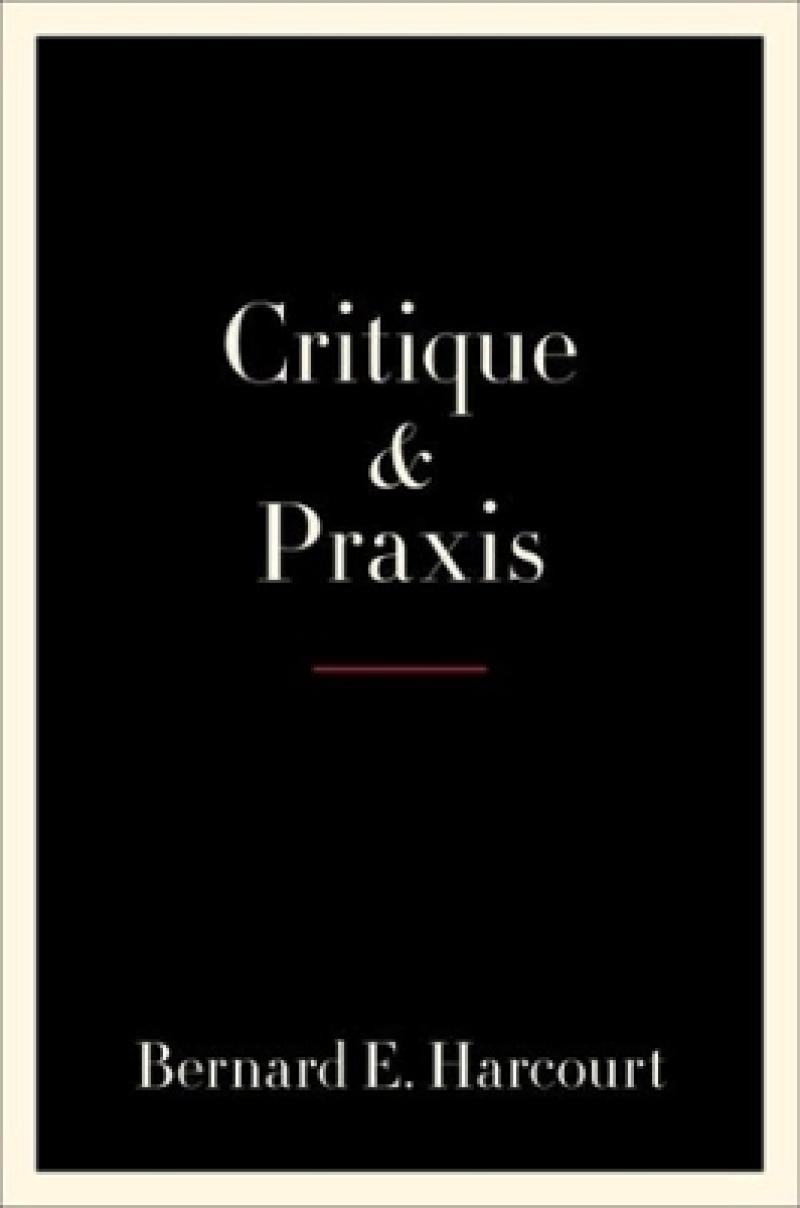<i>Critique and Praxis</i> is the work of a visionary revolutionary intellectual.
- Biodun Jeyifo, British Journal of Sociology
With his typical combination of erudition, eloquent argument, and theoretical clarity, Bernard Harcourt now gives us a complete account of his reading of contemporary critical philosophy, articulating it with immediate issues in the field of human rights and democratic politics. A tour de force which will give readers much to learn and much to think about. I will have it permanently on my desk, or not far.
- Étienne Balibar, author of <i>Violence and Civility: On the Limits of Political Philosophy</i>,
Has critical philosophy completed its mission or has it renounced the task, which it posed in the 1920s, to link theory and praxis in order to change the world? Harcourt’s response is unequivocal: the critical theory that emerged from the Frankfurt School has lost its original orientation and separated theory from the passion for praxis. Many other philosophical tendencies have since occupied this terrain, reimagining the theoretical horizon and trying to construct practices adequate to contemporary society. Harcourt studies and critiques them attentively, be they liberal currents or socialist variants, European philosophies of the common or insurrectionalist approaches. For Harcourt, however, critique must return to its radical roots and be done ‘en situation.’ This book inaugurates a turn from Foucault-style genealogies to a critical thought that is rooted in praxis and critiques it politically. With this passage, Harcourt exclaims, with Haraway, that ‘the only scientific thing to do is to revolt!’ And he confesses that in his previous books he only scratched at the surface of this conversion. Today the paradigm has shifted and praxis must be posed as subjectivation. If before the problem consisted in responding to ‘What is to be done?,’ today the question is ‘What more am I to do?’ Harcourt thus transforms critical philosophy into a manifesto of ethical engagement.
- Antonio Negri, coauthor of <i>Empire</i>,
A relentlessly honest and learned exploration of how critical theory can turn again to the task of changing the world. Learning from above but assiduously from below, activist legal scholar Bernard Harcourt utilizes illusion and value, makes theory and practice collide, and asks: 'What more am <i>I</i> to do?' Required reading.
- Gayatri Chakravorty Spivak, author of <i>Other Asias</i>,
Bernard Harcourt's pragmatic and comprehensive dissection of philosophy and the quest for social justice is timely, provocative, and critically needed in this moment of global uncertainty, endless conflict, and pervasive inequality.
- Bryan Stevenson, author of <i>Just Mercy: A Story of Justice and Redemption</i>,
Harcourt has produced a challenging book, which addresses many of our current predicaments, and he has the moral authority to command our attention.
Marx and Philosophy Review of Books
His mountainous text is a repetitive tool-box of notes and thoughts from his seminar series and own readings. Like lightning, brilliant ideas flash across the pages.
Counterpunch
By any measure, <i>Critique & Praxis</i> is an impressive contribution, passionate, lucid, deeply committed and nearly always generous in its disagreements. As a conversation between Foucauldian philosophy and radical-political engagement, it is a tour de force.
New Left Review
It’s lucidly written and relatively short on jargon. Which makes it an important book to pay attention to, even for those with no interest in abstruse political-social theories, because we urgently need new ways to critique the system we live in and develop new strategies to oppose and replace it.
History News Network
<i>Critique & Praxis</i> is one of the most provoking contributions to critical theory of the twenty-first century.
Foucault Studies
Bernard Harcourt's latest book is bold, brave, and too short.
- Frieder Vogelmann, British Journal of Sociology
A wide-ranging effort to take up the conundrum of critical theory, which has been with us since Marx wrote the eleventh thesis—that is, that we think and act in and on a damaged society.
Political Theory
Bernard E. Harcourt challenges us to move beyond decades of philosophical detours and to harness critical thought to the need for action. In a time of increasing awareness of economic and social inequality, Harcourt calls on us to make society more equal and just. Only critical theory can guide us toward a more self-reflexive pursuit of justice. Charting a vision for political action and social transformation, Harcourt argues that instead of posing the question, “What is to be done?” we must now turn it back onto ourselves and ask, and answer, “What more am I to do?”
Critique and Praxis advocates for a new path forward that constantly challenges each and every one of us to ask what more we can do to realize a society based on equality and justice. Joining his decades of activism, social-justice litigation, and political engagement with his years of critical theory and philosophical work, Harcourt has written a magnum opus.
Introduction: Toward a Critical Praxis Theory
Part I. Reconstructing Critical Theory
1. The Original Foundations
2. Challenging the Frankfurt Foundations
3. Michel Foucault and the History of Truth-Making
4. The Return to Foundations
5. The Crux of the Problem
6. Reconstructing Critical Theory
7. A Radical Critical Philosophy of Illusions
Part II. Reimagining the Critical Horizon
8. The Transformation of Critical Utopias
9. The Problem of Liberalism
10. A Radical Critical Theory of Values
11. A Critical Horizon of Endless Struggle
12. The Problem of Violence
13. A Way Forward
Part III. Renewing Critical Praxis
14. The Transformation of Praxis
15. The Landscape of Contemporary Critical Praxis
16. The New Space of Critical Praxis
Part IV. Reformulating Critique
17. Reframing the Praxis Imperative
18. What More Am I To Do?
19. Crisis, Critique, Praxis
Conclusion
Postscript
Notes
Bibliography
Acknowledgments
Name Index
Concept Index
